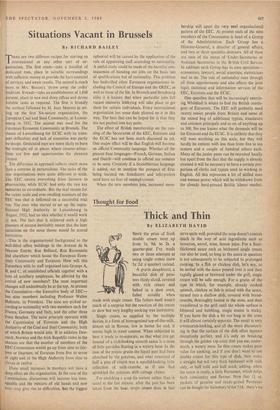Situations Vacant in Brussels
By RICHARD BAILEY THERE are two different recipes for starting an international or any other sort of or- ganisation. The first reads—take a handful of dedicated men, place in suitable surroundings with sufficient money to provide the bare essential of services, and await results. The second is much more in Mrs. Beeton's 'throw away the yolks' tradition. It reads—take an establishment of 1,848 persons, place in new and shiny offices and devise suitable tasks as required. The first is broadly the method followed by M. Jean Monnet in set- ting up the first Six-nation organisation, the European Coal and Steel Community, at Luxem- bourg in 1952. The second was used for the European, Economic Community at Brussels. The choice of Luxembourg for ECSC with its trans- port difficulties and lack of amenities was partly by design. Dedicated men are more likely to burn the midnight oil in places where counter-attrac- ions are few and opportunities for pleasure .
t k The difference in approach reflects much more . filar) a contrast in personalities. The tasks of the two organisations were quite different in scale. The EEC covers everything from farmers to pharmacists, while ECSC had only the two key iedustries to co-ordinate. But the real reason for the vaster scale and ever-swelling numbers of the EEC was that it followed on a successful trial run. The men who started to set up the snore- liational High Authority in Luxembourg in August, 1952, had no idea whether it would work or not. The fact that it achieved such a high fpcasure of success inevitably meant that the later variations on the same theme would be scored fortissimo.
This is the organisational background to the well-filled office buildings in the Avenue de la Joyeuse Entrée, Rue Belliard, Rue Ravenstein and elsewhere which house the European Econ- omic Community and Euratom. How will this Eurocfacy with its staff organised into Groups A, B, and C, of established officials together with a host of auxiliary employees, be affected by the arrival of new members? The most important changes will undoubtedly be at the top. At present the Commission—the Executive body of EEC— has nine members including Professor Walter Hallstein, its President. The nine are picked ac- cording to nationality with two members each for France, Germany and' Italy, and the other three from Benelux. The same principle operates with the Commission of Euratom and the High Authority of the Coal and Steel Community, both of which Britain would join. If in addition Den- mark, Norway and the Irish Republic come in the chances are that the number of members of the EEC Commission would go up from nine to thir- teen or fourteen, of Euratom from five to seven Or eight and of the High Authority from nine to eleven or twelve.
These small increases in numbers will have a deep effect on the organisation. In the case of the Commissions, discussions will become less man- ageable and the mixture of old hands and new boys may give rise to difficulties. But the biggest upheaval will be caused by the application of the rule of appointing staff according to nationality. A useful study could be made of the harmful con- sequences of handing out jobs on the basis not of qualifications but of nationality. This problem has bedevilled other European organisations in- cluding the Council of Europe and the OEEC, as well as those of the Six. In Brussels and Strasbourg alike it is known that when particular jobs fall vacant intensive lobbying will take place to get them for certain individuals. Every international organisation has some duds planted on it in this way. The best that can be hoped for is that they are not pushed into key posts.
The effect of British membership on the run- ning of the Secretariat of the EEC, Euratom and the ECSC has not been much discussed as yet. One major effect will be that English will become an official Community language. Whether all the present four languages—French, German, Italian and Dutch—will continue in official use remains to be seen. Certainly if a Scandinavian language is added, not to mention the prospect of Erse being insisted on, translators and interpreters need have no fear of unemployment.
When the new members join, increased mem- bership will upset the very near organisational pattern of the EEC. At present each of the nine members of the Commission is head of a Group of the Administration. Each Group has a Director-General, a director of general affairs, and two or three specialist directors. All of these are men of the status of Under-Secretaries or Assistant Secretaries in the British Civil Service. In addition each Group has its own specialists— economists, lawyers, social scientists, statisticians and so on. The rule of nationality runs through all these appointments and also affects the joint legal, statistical and information services of the EEC, Euratom and the ECSC.
One question that will be increasingly exercis- ing Whitehall is where to find the British contin- gent of Eurocrats. The EEC will probably need twenty senior people from Britain and some of the mixed bag of additional typists, translators and assistant principals and so on of anything up to 300. No one knows what the demands will be for Euratom and the ECSC. It is unlikely that they will want anything on this scale, but they will hardly be content with less than from five to ten seniors and a couple of hundred others each. Many of the junior posts can be recruited locally but apart from the fact that the supply is already strained it will be necessary to have a certain pro- portion of clerks and typists used to working in English. All this represents a lot of skilled man and woman power which will be withdrawn from the already hard-pressed British labour market.














































 Previous page
Previous page